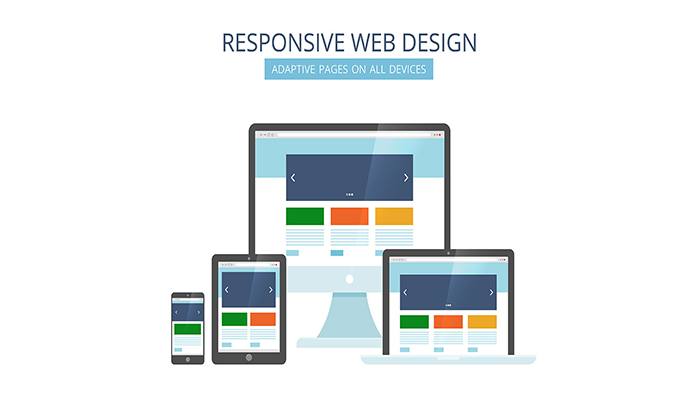Home / Blogs / Top 7 SEO Benefits Of Responsive Web Design
Top 7 SEO Benefits Of Responsive Web Design
 SEO
SEO
In today's digital age, having a website that is optimized for search engines is crucial for any business that wants to succeed online. One of the key factors in achieving this optimization is through responsive web design. A website that uses responsive design can change its layout and content to fit multiple screen sizes, making it usable on desktop and mobile devices. Let’s take a look at the top 7 SEO benefits of having a responsive web design.
What is a responsive web design?
The process of optimising the layout so that all the crucial information is shown in the best possible way for viewers to read and navigate with the least amount of resizing, panning, and scrolling on any type of device or screen size is known as responsive design. In other words, it guarantees the website's effectiveness and accessibility across all platforms. As a result, there is no longer a need for separate design and development phases for every new device that enters the market.
What is the importance of responsive web design?
It is essential to make sure that websites adapt and offer the best user experience possible across all platforms given the proliferation of different devices and screen sizes. Whether a consumer is visiting a website from a desktop, smartphone, or tablet, responsive design offers easy navigation and readability. Additionally, responsive design enhances mobile friendliness and website load speeds, which benefits search engine optimisation (SEO). Businesses can boost user engagement, increase conversions, and successfully reach their target audience across a variety of devices by implementing responsive web design.
The top advantages of a responsive website for SEO
- Improved user experience
User experience (UX) is a critical factor for both website visitors and search engines. Whether using a laptop, tablet, or smartphone, responsive web design offers a smooth experience. Your website's usability and content quality are not compromised when users view it from any device. A positive user experience leads to longer visit durations, lower bounce rates, and increased engagement – all of which are crucial SEO ranking factors.
- Mobile first-indexing
A mobile-first indexing strategy has been implemented by search engines in response to the growing dominance of mobile surfing. This indicates that when deciding search ranks, search engines give the mobile version of a website priority. Your website will be mobile-friendly with a responsive web design, helping it to appear higher in mobile search results. A website that has been optimised for mobile is more likely to reach more people and generate more organic traffic.
- Faster page loading speed
Search engine algorithms heavily weight page loading speed when determining rankings. Flexible graphics, CSS media queries, and well-written code are all used in responsive web design to enhance website performance on various devices. Users like your site more, search engines favour it, and your rankings rise as a result of speedier loading times. Additionally, optimizing your page speed encourages people to explore more pages and decreases bounce rates, which increases conversion rates.
- Reduced duplicate content
The SEO efforts for your website might be hampered from duplicate material. You run the risk of unintentionally creating duplicate content problems if you have different desktop and mobile versions. This issue is resolved with responsive web design, which uses a single URL and constant content on all platforms. The trustworthiness, authority, and search rankings of your website are all improved by eliminating duplicate material.
- Increased social sharing
On social networking sites, social signals like likes, shares, and comments have a favourable effect on SEO. By delivering a consistent and user-friendly experience across all devices, responsive web design promotes social sharing. On both desktop and mobile platforms, users are more inclined to interact with and share material that is quickly accessible and aesthetically pleasing. This in turn improves your website's search engine positioning, social media presence, and exposure.
- Enhanced link building
A vital component of SEO is link building, and flexible site design may help with this process. You have a higher chance of obtaining high-quality backlinks from reliable sites if your website is mobile-friendly. Since other website owners favour connecting to mobile-responsive sites, websites that do not have a mobile friendly website design sometimes struggle to gain backlinks. Your prospects for link building increase thanks to responsive design, which benefits your website's authority and search results.
- Improved local SEO
Responsive site design is essential to the success of local SEO for companies aiming to reach nearby customers. Search engines prioritises mobile-friendly websites when providing local search results due to the increase in location-based queries. Your website becomes accessible and user-friendly for mobile customers looking for local information by implementing responsive design. This increases the possibilities of turning up in local search results, improves targeted traffic to your website, and aids in local SEO.
Effective SEO tactics now require responsive web design. Your website's user experience, visibility, and search rankings all improve when it is optimised for various devices. Beyond SEO, responsive design has several advantages for your total online presence and commercial success. Use responsive web design to provide a smooth user experience. Whether it is seo services for small business or a large corporate firm, it is necessary that you have a responsive website.
As a digital marketing agency in Mumbai, we are aware of the importance of responsive site design and how it affects SEO. Our team at Verve Media of talented experts specialises in developing websites that are extremely functional, visually appealing, and mobile-friendly. With the help of our experience, we can turn your website into a powerful resource that is responsive, assuring peak performance and increasing your online presence.





